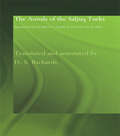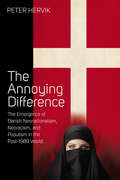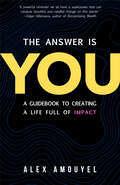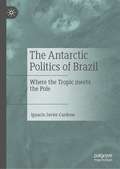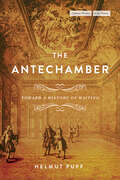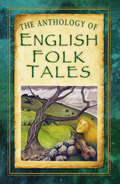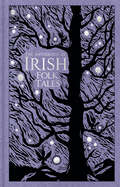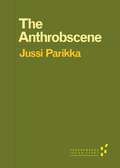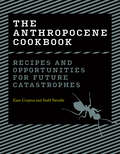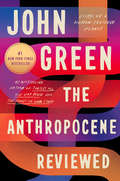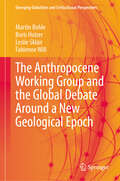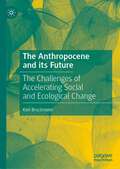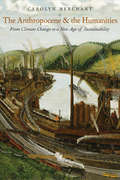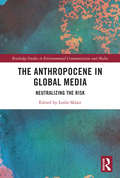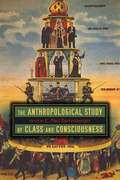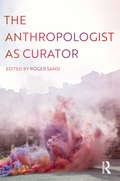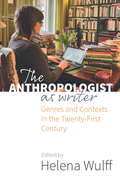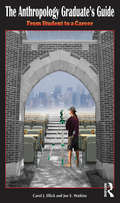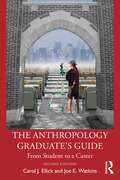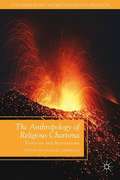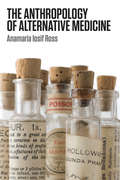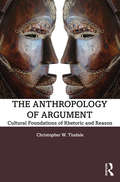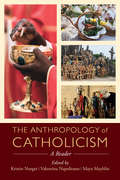- Table View
- List View
The Annals of the Saljuq Turks: Selections from al-Kamil fi'l-Ta'rikh of Ibn al-Athir (Routledge Studies in the History of Iran and Turkey)
by D.S. RichardsIbn al-Athir, who died in the 13th century, is one of the most important historians of Islam. His major chronicle, the Kamil fi'l-Ta'rikh, is one of the greatest achievements of Muslim historiography for the range and comprehensiveness of the sources it assembled and for its narrative, covering the whole sweep of Islamic history up to his own lifetime. This volume of D.S. Richards' translation covers the early years of conquest and the period of the 'great sultanate'. With its copious annotations, the translation will open a direct window into this period of history for non-Arabic readers and will be an invaluable aid and resource for students and scholars.
The Annoying Difference
by Peter HervikThe Muhammad cartoon crisis of 2005--2006 in Denmark caught the world by surprise as the growing hostilities toward Muslims had not been widely noticed. Through the methodologies of media anthropology, cultural studies, and communication studies, this book brings together more than thirteen years of research on three significant historical media events in order to show the drastic changes and emerging fissures in Danish society and to expose the politicization of Danish news journalism, which has consequences for the political representation and everyday lives of ethnic minorities in Denmark.
The Answer Is You: A Guidebook to Creating a Life Full of Impact
by Alex AmouyelProblem-Solving Requires Innovation, Activism, and YouAn important read for those on the journey of making this world better and wondering where to start.” ?Jacqueline Novogratz, founder and CEO of Acumen, author of New York Times bestseller The Blue Sweater#1 New Release in Volunteer Work, Philanthropy & Charity, and Nonprofit OrganizationsPeople from all walks of life yearn to do something that adds value to others and to be someone who makes a difference in their community and the world.Now Alex Amouyel is inviting you to become part of the solution. Alex, author of The Answer is You, is the founding Executive Director of Solve, an initiative at the Massachusetts Institute of Technology (MIT) with a mission to solve world challenges. Solve finds incredible tech-based social entrepreneurs around the world and funds them to develop lasting, transformational tech-based solutions.Take action for social impact.The Answer is You is here to inform you that being a change agent starts with doing good deeds and being a community helper. Everyone can do something with the skills and resources they already have─they just need ideas for how. The Answer is You inspires every person to start thinking critically about the problems we face and the solutions we might be able to offer to enact change.Inside, you’ll find:Motivating and encouraging stories of amazing impact innovators from MIT SolveGuidance on how to take action in the world in big and small ways to get resultsA path to hope and action for problem-solving in your community and within societyIf you like books by women in leadership and enjoyed reading Create the Future + the Innovation Handbook: Tactics for Disruptive Thinking, Believe in People: Bottom-Up Solutions for a Top-Down World, The Innovator’s DNA: Mastering the Five Skills of Disruptive Innovators, you’ll love The Answer is You: A Guidebook to Creating a Life Full of Impact.
The Antarctic Politics of Brazil: Where the Tropic meets the Pole
by Ignacio Javier CardoneThis book focuses on the connection between Brazil and Antarctica, two regions that can be seen as distant and contrasting, but are physically, culturally and politically associated. Relying on archival material and previous literature, the book offers a thorough account of Brazil’s involvement with one of the most significant regions in the global environment. The author explores the place of Antarctica in geopolitical works and in the first initiatives involving Brazil and the continent, from the rise of geopolitical thought in Brazil in the 1930s up to the present day. He argues that the connection between Brazil and Antarctica is not without its difficulties, but it has been structured in many enduring ways. The book covers causes for the delay and eventual adoption of a now active foreign policy regarding the region, the policy’s early performance in Antarctica, its evolution as a consequence of domestic and international changes, the increasing interest in the environment, and further recent developments.
The Antechamber: Toward a History of Waiting (Cultural Memory in the Present)
by Helmut PuffHelmut Puff invites readers to visit societies and spaces of the past through the lens of a particular temporal modality: waiting. From literature, memoirs, manuals, chronicles, visuals, and other documents, Puff presents a history of waiting anchored in antechambers—interior rooms designated and designed for people to linger. In early modern continental Western Europe, antechambers became standard in the residences of the elites. As a time-space infrastructure these rooms shaped encounters between unequals. By imposing spatial distance and temporal delays, antechambers constituted authority, rank, and power. Puff explores both the logic and the experience of waiting in such formative spaces, showing that time divides as much as it unites, and that far from what people have said about early moderns, they approached living in time with apprehensiveness. Unlike how contemporary society primarily views the temporal dimension, to early modern Europeans time was not an objective force external to the self but something that was tied to acting in time. Divided only by walls and doors, waiters sought out occasions to improve their lot. At other times, they disrupted the scripts accorded them. Situated at the intersection of history, literature, and the history of art and architecture, this wide-ranging study demonstrates that waiting has a history that has much to tell us about social and power relations in the past and present.
The Anthology of English Folk Tales
by Folk Tales AuthorsThis enchanting collection of stories gathers together folk tales from across England in one special volume. Drawn from The History Press’ popular Folk Tales series, herein lies a treasure trove of tales from a wealth of talented storytellers performing in the country today, including prominent figures Taffy Thomas MBE, Hugh Lupton and Helen East. From hidden chapels and murderous vicars to travelling fiddlers and magical shape-shifters, this book celebrates the distinct character of England’s different customs, beliefs and dialects, and is a treat for all who enjoy a good yarn.
The Anthology of Irish Folk Tales
by History Press UKCarefully selected stories from the celebrated Folk Tales series have been gathered here for this special volume. Herein lies a treasure trove of tales from a wealth of talented storytellers performing in the country today. From banshees, pookas and changelings to rainbows, fairies and leprechauns, this book celebrates the distinct character of Ireland's different customs, beliefs and dialects, and is a treat for all who enjoy a well-told story.
The Anthrobscene (Forerunners: Ideas First)
by Jussi ParikkaSmartphones, laptops, tablets, and e-readers all at one time held the promise of a more environmentally healthy world not dependent on paper and deforestation. The result of our ubiquitous digital lives is, as we see in The Anthrobscene, actually quite the opposite: not ecological health but an environmental wasteland, where media never die. Jussi Parikka critiques corporate and human desires as a geophysical force, analyzing the material side of the earth as essential for the existence of media and introducing the notion of an alternative deep time in which media live on in the layer of toxic waste we will leave behind as our geological legacy. Forerunners: Ideas First is a thought-in-process series of breakthrough digital publications. Written between fresh ideas and finished books, Forerunners draws on scholarly work initiated in notable blogs, social media, conference plenaries, journal articles, and the synergy of academic exchange. This is gray literature publishing: where intense thinking, change, and speculation take place in scholarship.
The Anthropocene Cookbook: Recipes and Opportunities for Future Catastrophes
by Zane Cerpina Stahl StenslieMore than sixty speculative art and design projects explore how art, food, and creative thinking can prepare us for future catastrophes.In the Age of the Anthropocene—a era characterized by human-caused climate disaster—catastrophes and dystopias loom. The Anthropocene Cookbook takes our planetary state of emergency as an opportunity to seize the moment to imagine constructive change and new ideas. How can we survive in an age of constant environmental crises? How can we thrive? The Anthropocene Cookbook answers these questions by presenting a series of investigative art and design projects that explore how art, food, and creative thinking can prepare us for future catastrophes. This cookbook of ideas rethinks our eating habits and traditions, challenges our food taboos, and proposes new recipes for humanity&’s survival. These more than sixty projects propose new ways to think and make food, offering tools for creative action rather than traditional recipes. They imagine modifying the human body to digest cellulose, turning plastic into food, tasting smog, extracting spices and medicines from sewage, and growing meat in the lab. They investigate provocative possibilities: What if we made cheese using human bacteria, enabled human photosynthesis through symbiosis with algae, and brought back extinct species in order to eat them? The projects are diverse in their creative approaches and their agendas—multilayered, multifaceted, hybrid, and cross-pollinated. The Anthropocene Cookbook offers a survival guide for a future gone rogue, a road map to our edible futures.
The Anthropocene Reviewed: Essays on a Human-Centered Planet
by John GreenA deeply moving and insightful collection of personal essays from #1 bestselling author John Green. <p><p>The Anthropocene is the current geologic age, in which humans have profoundly reshaped the planet and its biodiversity. In this remarkable symphony of essays adapted and expanded from his groundbreaking podcast, bestselling author John Green reviews different facets of the human-centered planet on a five-star scale—from the QWERTY keyboard and sunsets to Canada geese and Penguins of Madagascar. Funny, complex, and rich with detail, the reviews chart the contradictions of contemporary humanity. As a species, we are both far too powerful and not nearly powerful enough, a paradox that came into sharp focus as we faced a global pandemic that both separated us and bound us together. <p><p>John Green’s gift for storytelling shines throughout this masterful collection. The Anthropocene Reviewed is a open-hearted exploration of the paths we forge and an unironic celebration of falling in love with the world. <p> <b>New York Times Bestseller</b>
The Anthropocene Working Group and the Global Debate Around a New Geological Epoch (Emerging Globalities and Civilizational Perspectives)
by Boris Holzer Martin Bohle Leslie Sklair Fabienne WillThis book examines the role of the Anthropocene Working Group (AWG) in public and scholarly discussions of the meaning of the Anthropocene proposal. The status of the Anthropocene, both as a geoscientific concept and as a cultural concept becoming increasingly familiar in the public sphere, has been highly controversial. While geoscientists focus on possible geological markers and periodisation, the social sciences, environmental humanities, and creative arts have taken up the Anthropocene as a cultural concept to make sense of the planetary environmental crisis and contemporary society. This book documents intra-, inter-, and transdisciplinary debates, particularly, although not limited to, how different scholarly disciplines have responded to the Anthropocene proposal. The authors analyse how the AWG has become the focal point of a debate that straddles the boundaries between academic disciplines and public perceptions of science. The AWG thus serves as a case of the globalisation of science in terms of the global interconnectedness of scientific disciplines and the cultural significance of the Anthropocene proposal.
The Anthropocene and its Future: The Challenges of Accelerating Social and Ecological Change
by Karl BruckmeierThis book analyses the complex social and ecological processes of the Great Acceleration, the Great Transformation, and sustainable development that shape the future of the global society in the twenty-first century. The first process takes place for a longer time, the second over the past thirty years, with attempts to build a sustainable economy and society in the global policy of sustainable development. The processes and their interaction will be discussed with knowledge from inter- and transdisciplinary transformation research, social and political ecology, and theories of modern society. The guiding theoretical concepts for the social-ecological transformation will be clarified: the concepts of acceleration, transformation, and sustainable development, and the societal and ecological processes they include. To obtain a more detailed picture of the changes in the global social-ecological system, different parts of the global transformation, the digital transformation, the transformation of food systems, and the transformation of modes of living in the social lifeworld are described to show the complex changes in the epoch of the Anthropocene more concretely. The global change processes in society and nature are caused by human forces but are difficult to control through policy and governance. With the interdisciplinary integration of concepts and knowledge, it becomes possible to provide a more detailed picture, of the difficulties to achieve a sustainable future society.
The Anthropocene and the Humanities: From Climate Change to a New Age of Sustainability (The Future Series)
by Carolyn MerchantA wide-ranging and original introduction to the Anthropocene that offers fresh, theoretical insights bridging the sciences and the humanities From noted environmental historian Carolyn Merchant, this book focuses on the original concept of the Anthropocene first proposed by Paul Crutzen and Eugene Stoermer in their foundational 2000 paper. It undertakes a broad investigation into the ways in which science, technology, and the humanities can create a new and compelling awareness of human impacts on the environment. Using history, art, literature, religion, philosophy, ethics, and justice as the focal points, Merchant traces key figures and developments in the humanities throughout the Anthropocene era and explores how these disciplines might influence sustainability in the next century. Wide-ranging and accessible, this book from an eminent scholar in environmental history and philosophy argues for replacing the Age of the Anthropocene with a new Age of Sustainability.
The Anthropocene in Global Media: Neutralizing the risk (Routledge Studies in Environmental Communication and Media)
by Leslie SklairThis book offers the first systematic study of how the ‘Anthropocene’ is reported in mass media globally, drawing parallels between the use (or misuse) of the term and the media’s attitude towards the associated issues of climate change and global warming. Identifying the potential dangers of the Anthropocene provides a useful path into a variety of issues that are often ignored, misrepresented, or sidelined by the media. These dangers are widely discussed in the social sciences, environmental humanities, and creative arts, and this book includes chapters on how the contributions of these disciplines are reported by the media. Our results suggest that the natural science and mass media establishments, and the business and political interests which underpin them, tend to lean towards optimistic reassurance (the ‘good’ Anthropocene), rather than pessimistic alarmist stories, in reporting the Anthropocene. In this volume, contributors explore how dangerous this ‘neutralizing’ of the Anthropocene is in undermining serious global action in the face of the potential existential risks confronting humanity. The book presents results from media in more than 100 countries in all major languages across the globe. It covers the reporting of key environmental issues, such as the impact of climate change and global warming on oceans, forests, soil, biodiversity, and the biosphere. We offer explanations for differences and similarities in how the media report the Anthropocene in different regions of the world. In doing so, the book argues that, though it is still controversial, the idea of the Anthropocene helps to concentrate minds and behaviour in confronting ongoing ecological (and Coronavirus) crises. The Anthropocene in Global Media will be of interest to students and scholars of environmental studies, media and communication studies, and the environmental humanities, and all those who are concerned about the survival of humans on planet Earth.
The Anthropological Study of Class and Consciousness
by E. Paul DurrenbergerPresenting prehistoric, historic, and ethnographic data from Mongolia, China, Iceland, Mexico, Brazil, and the United States, The Anthropological Study of Class and Consciousness offers a first step toward examining class as a central issue within anthropology. Contributors to this volume use the methods of historical materialism, cultural ecology, and political ecology to understand the realities of class and how they evolve. Five central ideas unify the collection: the objective basis for class in different social orders; people's understanding of class in relation to race and gender; the relation of ideologies of class to realities of class; the U.S. managerial middle-class denial of class and emphasis on meritocracy in relation to increasing economic insecurity; and personal responses to economic insecurity and their political implications. Anthropologists who want to understand the nature and dynamics of culture must also understand the nature and dynamics of class. The Anthropological Study of Class and Consciousness addresses the role of the concept of class as an analytical construct in anthropology and how it relates to culture. Although issues of social hierarchy have been studied in anthropology, class has not often been considered as a central element. Yet a better understanding of its role in shaping culture, consciousness, and people's awareness of their social and natural world would in turn lead to better understanding of major trends in social evolution as well as contemporary society. This book will be of great interest to students and scholars of anthropology, labor studies, ethnohistory, and sociology.
The Anthropological Study of Class and Consciousness
by E. Paul DurrenbergerPresenting prehistoric, historic, and ethnographic data from Mongolia, China, Iceland, Mexico, Brazil, and the United States, The Anthropological Study of Class and Consciousness offers a first step toward examining class as a central issue within anthropology. Contributors to this volume use the methods of historical materialism, cultural ecology, and political ecology to understand the realities of class and how they evolve. Five central ideas unify the collection: the objective basis for class in different social orders; people's understanding of class in relation to race and gender; the relation of ideologies of class to realities of class; the U.S. managerial middle-class denial of class and emphasis on meritocracy in relation to increasing economic insecurity; and personal responses to economic insecurity and their political implications. Anthropologists who want to understand the nature and dynamics of culture must also understand the nature and dynamics of class. The Anthropological Study of Class and Consciousness addresses the role of the concept of class as an analytical construct in anthropology and how it relates to culture. Although issues of social hierarchy have been studied in anthropology, class has not often been considered as a central element. Yet a better understanding of its role in shaping culture, consciousness, and people's awareness of their social and natural world would in turn lead to better understanding of major trends in social evolution as well as contemporary society. This book will be of great interest to students and scholars of anthropology, labor studies, ethnohistory, and sociology.
The Anthropologist as Curator (Criminal Practice Ser.)
by Roger SansiWhy do contemporary art curators define their work as ethnography? How can curation illuminate the practice of contemporary anthropology? Does anthropology risk disappearing as a specific discipline within the general model of the curatorial? The Anthropologist as Curator collects together the research of international scholars working at the intersection of anthropology and contemporary art in order to explore these questions. The essays in the book challenge what it means to do ethnographic work, as well as the very definition of the discipline of anthropology in confrontation with the model of the curatorial. The contributors examine these ideas from a variety of angles, and the book includes perspectives from anthropologists who have set up their own exhibitions; those who have conducted fieldwork on the arts, including participatory practices, digital images and sound; and contributors who are currently working in a curatorial capacity at a museum.With case studies from the USA, Canada, Germany, Brazil, Mexico, India and Japan, the book represents an international perspective and is relevant to students and scholars of anthropology, contemporary art, museum studies, curatorial studies and heritage studies.
The Anthropologist as Writer: Genres and Contexts in the Twenty-First Century
by Helena WulffWriting is crucial to anthropology, but which genres are anthropologists expected to master in the 21st century? This book explores how anthropological writing shapes the intellectual content of the discipline and academic careers. First, chapters identify the different writing genres and contexts anthropologists actually engage with. Second, this book argues for the usefulness and necessity of taking seriously the idea of writing as a craft and of writing across and within genres in new ways. Although academic writing is an anthropologist's primary genre, they also write in many others, from drafting administrative texts and filing reports to composing ethnographically inspired journalism and fiction.
The Anthropology Graduate's Guide: From Student to a Career
by Joe E Watkins Carol J EllickMom will ask, “What can you do with a degree in anthropology?” If you want the answer, then you need this book. Applied anthropologists Carol Ellick and Joe Watkins present a set of practical steps that will assist you through the transition from your career as a student into a career in a wide range of professions that an anthropology degree can be used. The stories, scenarios, and activities presented in this book are intended to assist you in learning how to plan for the next five years, write your letter of introduction, construct your resume, and best present the knowledge, skills, and abilities learned in class to prospective employers. Ellick and Watkins’ step-by-step approach helps you create a portfolio that you will use time and time again as you build your career.
The Anthropology Graduate's Guide: From Student to a Career
by Joe E. Watkins Carol J. EllickIn this revised edition of The Anthropology Graduate’s Guide, Carol Ellick and Joe Watkins present a set of practical steps that guides the reader through the transition from student to professional, covering a wide range of career options for which an anthropology degree is applicable. It includes an overview of anthropology as a discipline, professional qualifications and key skills, an outline of key jobs and future careers, and guidance on job application materials and interviews, as well as discussions of professional communication styles and the importance of belonging to professional organizations. New to this edition are updates to technology recommendations (portfolio building, Skype and Zoom interviews, social media, etc.), tips for formatting résumés, discussions of navigating harassment and inappropriate behavior, discussions of diversity, social justice, and inclusion, and updated statistics on finding jobs in and out of academia. Ultimately, the stories, scenarios, and activities presented in this book will show a reader how to use knowledge, skills, and abilities learned in the classroom in a career setting.
The Anthropology Of Religious Charisma
by Charles LindholmAccording to Max Weber, charisma is opposed to bureaucratic order. This collection reveals the limits of that formula. The contributors show how charisma is a part of cultural frameworks while retaining its ecstatic character among American and Italian Catholics, Syrian Sufis, Taiwanese Buddhists, Hassidic Jews, and Amazonian shamans, among others.
The Anthropology of Alternative Medicine
by Anamaria Iosif RossAlternative medicine is not a fashionable new trend but an established cultural strategy, as well as a dynamic feature of mainstream contemporary medicine, in which elements of folk traditions are often blended with western scientific approaches.The Anthropology of Alternative Medicine is a concise yet wide-ranging exploration of non-biomedical healing. The book addresses a broad range of practices including: substance, energy and information flows (e.g. helminthic therapy); spirit, consciousness and trance (e.g. shamanism); body, movement and the senses (e.g. reiki and aromatherapy); as well as classical medical traditions as complements or alternatives to Western biomedicine (e.g. Ayurveda). Exploring the cultural underpinnings of contemporary healing methods, while assessing current ideas, topics and resources for further study, this book will be invaluable to undergraduate and graduate students in anthropology, sociology, psychology, and health related professions such as nursing, physical and occupational therapy, and biomedicine.
The Anthropology of Argument: Cultural Foundations of Rhetoric and Reason
by Christopher W. TindaleThis innovative text reinvigorates argumentation studies by exploring the experience of argument across cultures, introducing an anthropological perspective into the domains of rhetoric, communication, and philosophy. The Anthropology of Argument fills an important gap in contemporary argumentation theory by shifting the focus away from the purely propositional element of arguments and onto how they emerge from the experiences of peoples with diverse backgrounds, demonstrating how argumentation can be understood as a means of expression and a gathering place of ideas and styles. Confronting the limitations of the Western tradition of logic and searching out the argumentative roles of place, orality, myth, narrative, and audience, it examines the nature of multi-modal argumentation. Tindale analyzes the impacts of colonialism on the field and addresses both optimistic and cynical assessments of contextual differences. The results have implications for our understanding of contemporary argumentative discourse in areas marked by deep disagreement, like politics, law, and social policy. The book will interest scholars and upper-level students in communication, philosophy, argumentation theory, anthropology, rhetoric, linguistics, and cultural studies.
The Anthropology of Catholicism: A Reader
by Kristin NorgetAimed at a wide audience of readers, The Anthropology of Catholicism is the first companion guide to this burgeoning field within the anthropology of Christianity. Bringing to light Catholicism’s long but comparatively ignored presence within the discipline of anthropology, the book introduces readers to key studies in the field, as well as to current analyses on the present and possible futures of Catholicism globally. This reader provides both ethnographic material and theoretical reflections on Catholicism around the world, demonstrating how a revised anthropology of Catholicism can generate new insights and analytical frameworks that will impact anthropology as well as other disciplines.
The Anthropology of Childhood
by David F. LancyThe Anthropology of Learning in Childhood offers a portrait of childhood across time, culture, species, and environment. It demonstrates that anthropologists studying childhood can offer a description and theoretically sophisticated account of childrenÆs learning and its role in their development, socialization, and enculturation. Further, it reveals the particular contribution that childrenÆs learning makes to the construction of society and culture as well as the role that culture-acquiring children play in human evolution. Contributors write from various perspectives, including archaeology, primatology, biological and cultural anthropology, and cross-cultural psychology. Book jacket.
